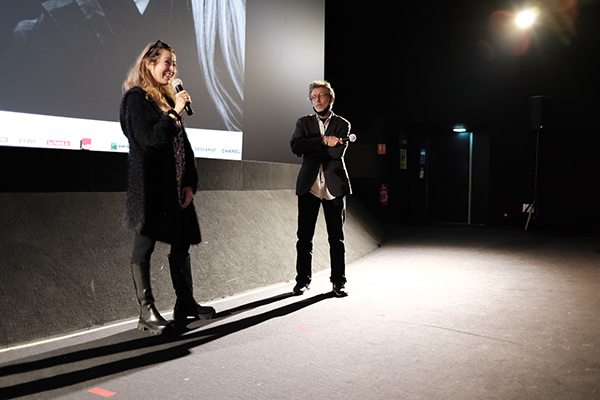Happening
at Lumière
PostED ON OCTOBER 14
Nils Tavernier, Bertrand Tavernier's son, and Charlotte Kady, his interpreter, introduced L.627 by Bertrand Tavernier.
Charlotte Kady: "When we presented this film thirty years ago with Bertrand, the exercise was very easy because he was just starting out, and we were trying to hop on board. We usually had half a second left to add a little detail! The first motive for this film was his meeting with scriptwriter Michel Alexandre, who began to tell him about the life of a cop in the field and the lack of means that went with it. Bertrand wanted to do further research and he was amazed by what he discovered. It was so incredible! L.627 refers to the public health code, associated with the criminal code, which punishes all offences related to drug trafficking, consumption and possession.”

Nils Tavernier, le fils de Bertrand, et Charlotte Kady, son interprète,
présentant L.627, de Bertrand Tavernier
© Benoit Pavan
Nils Tavernier: "My father made many films influenced by reality. I played a narcotics cop in a film by Catherine Breillat with Claude Brasseur. I had spent a year of my life with them. I said to myself that I had to make a fictional film about it and I took my father to the nearest DJP, which was located near the Place Beauvau. There, he spent a night with Michel Alexandre. Eighty percent of the film's footage, we witnessed it. It's a movie made with real drug addicts and real dealers. My father wanted to make films, but not for the glitz. He didn't want to make films with stars, but with actors he found right for the roles. So it wasn't easy. L.627 was a difficult picture to make financially. The film still has a cult following in the police force today."
Charlotte Kady: "After L.627, all the police series changed the way they portrayed the police. The Minister of the Interior at the time, Paul Quilès, had two high-ranking police officers appear on a television news programme to refute what the film was saying. This created a huge scandal. Bertrand would later say that Paul Quilès had been his best press officer."
Nils Tavernier: "The two cops who had been convinced by the State to say that the film was untrue ran into my father in a Parisian restaurant two or three years later and apologised."
Reported by Benoit Pavan

